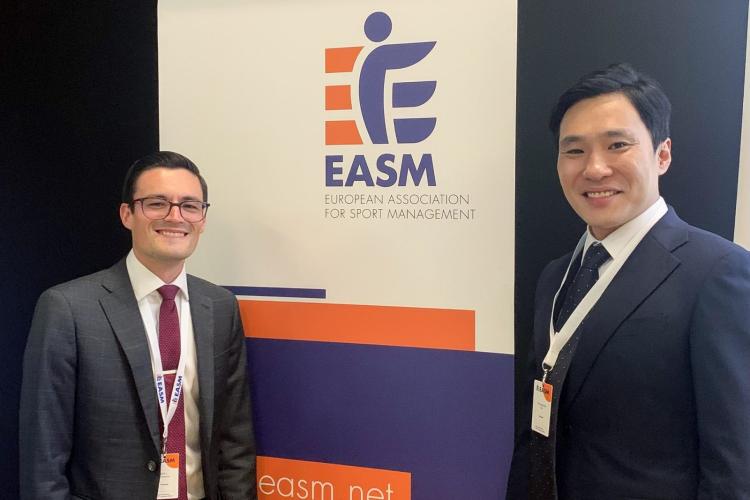Changwook Kim has always examined the world from different perspectives, so it's no surprise his research follows this same philosophy.
The Brock University Assistant Professor of Sport Management recently received a New Researcher Award from an international industry organization for his use of innovative methodology in conducting novel research.
Kim uses advanced spatiotemporal, or space-time, modelling techniques and tools, such as the geographic mapping software ArcGIS Pro and R software, to assess and visualize how different clusters in the sport industry impact community resilience.

Sport Management Postdoctoral Research Fellow Erik Lachance (left) and Assistant Professor Changwook Kim were recently recognized by the European Association for Sport Management.
Clusters include sports facilities, spectator sports, sports instruction, sports good wholesalers, manufacturers, promoters and agents/managers. Key findings from an analysis of 3,108 American counties totaling 21,756 sport industry clusters show that counties with agents/managers, spectator sports and promoters saw increasing positive associations with resilience, while counties with sports facilities and sport goods wholesalers saw decreasing associations over time.
Kim's research was inspired by the growing importance of communities adapting to and coping with environmental, economic and social risks in the aftermath of global challenges such as the COVID-19 pandemic, Middle East respiratory syndrome and the 2008 financial crisis.
"I wanted to provide actionable insights that could inform policy and foster sustainable community development from a bird's eye view," he says. "By understanding the spatiotemporal dynamics of sport clusters, decision-makers can develop targeted strategies to leverage sport industries for enhancing community resilience, such as through tailored investments in sports facilities or human capital development in sport sectors."
Of equal or even greater importance to the research outcomes is Kim's methodology, which is interdisciplinary and novel to sport management research. The spatiotemporal techniques incorporate economic geography and community science with sport management disciplines.
"The purpose of my research is not to generate the findings, but to identify the geographical differences," he says. "We have never seen this kind of research in the Sport Management field. It's the first of its kind to analyze macro-level spatiotemporal data."
Kim submitted his research to the European Association for Sport Management and was shortlisted as a finalist for the European Sport Management Quarterly's New Researcher Award. He and fellow finalist Erik Lachance, who is a Postdoctoral Research Fellow with Brock's Department of Sport Management, each presented their research on the international stage in Paris, France, this past September. Kim was awarded top prize and Lachance placed third.
"It's a real honour for us to showcase our research internationally," says Lachance. "Brock continuously punches above its weight class, so to speak, in terms of impactful research and contributions to the field."
Lachance came to Brock two years ago and is collaborating on research with his supervisor, Associate Professor of Sport Management Shannon Kerwin, as well as Russell Hoye from La Trobe University in Australia.
Their research examines how nonprofit sport organization boards of directors make decisions and the factors influencing decision making and effectiveness.
One component Lachance emphasizes is the importance of having a board of directors that includes individuals from inside and outside the sport industry. A variety of core competencies from diverse occupational backgrounds leads to better-informed decisions.
Findings also show boards are increasingly relying on data to make decisions, either via the organizations' own research, using consultants or gathering information externally from member associations.
Some of the emphasis on data-based decision-making is in response to pressures from stakeholders and sport governing bodies calling for greater accountability and transparency.
"Boards are becoming more professionalized in that they're formalizing their policies and procedures and placing more importance on data to make more informed decisions in the best interests of their stakeholders," says Lachance.
The Post-Doctoral Research Fellow's time with Brock's Department of Sport Management has been positive, and this recognition attests to the experiences and mentorship he has received at Brock.
"Brock's Department of Sport Management continues to demonstrate its research prowess and established international reputation within our field," he says. "My experience has been incredibly positive here and I highly recommend Brock University as a location to pursue a postdoc because of the fantastic opportunities that exist to teach and conduct research."












